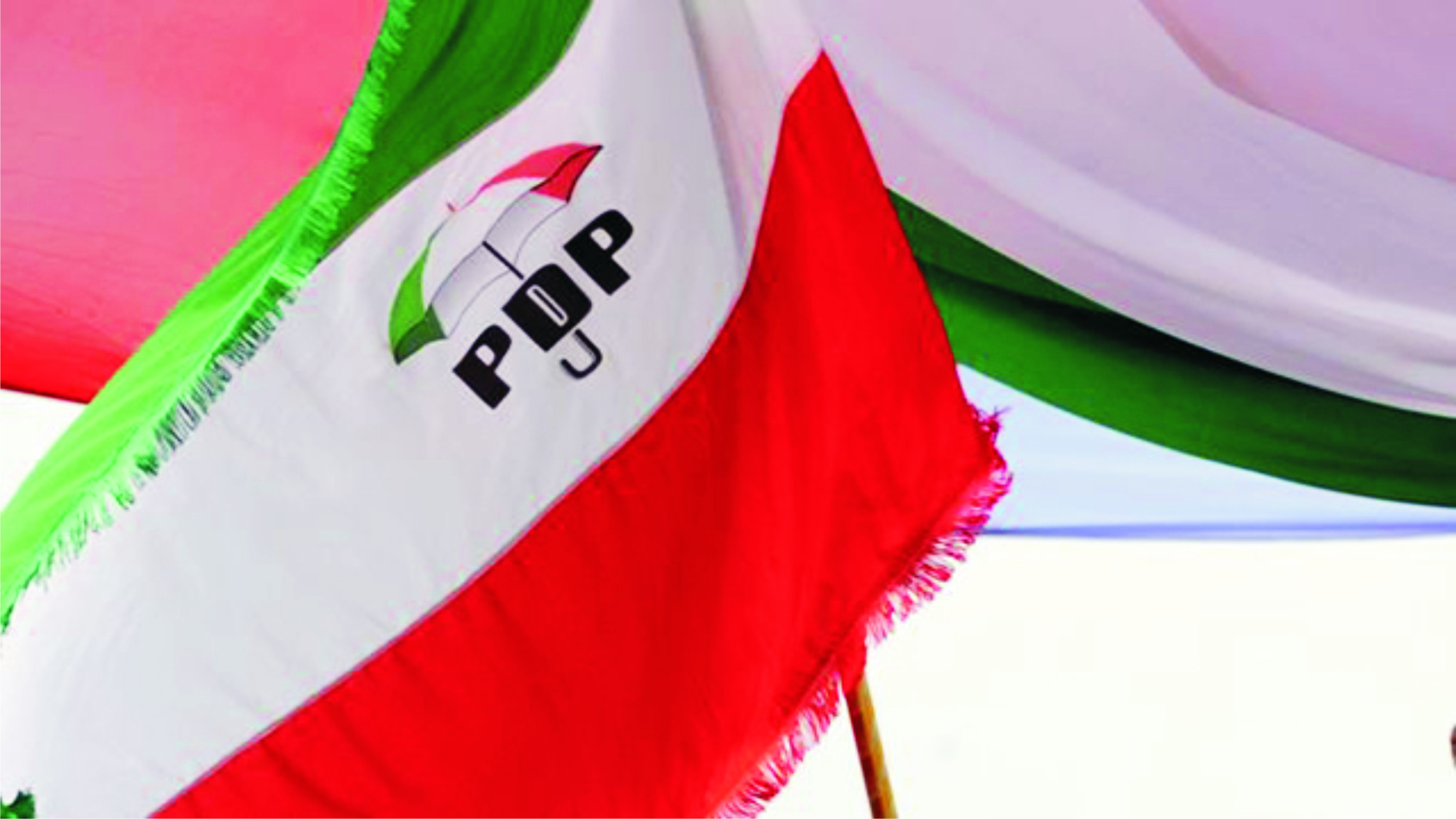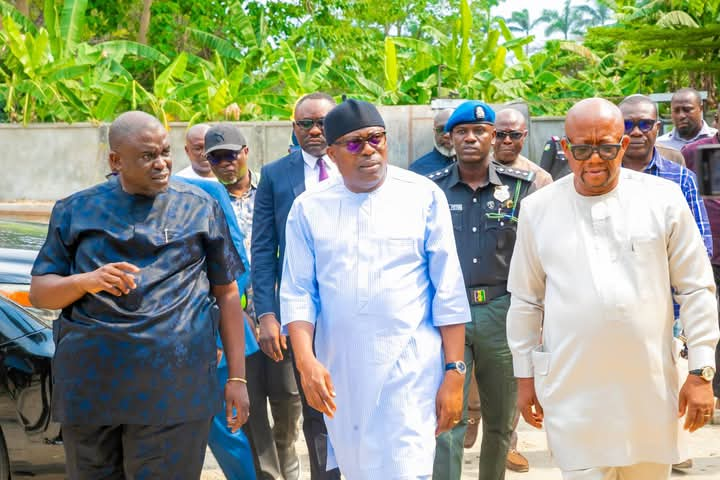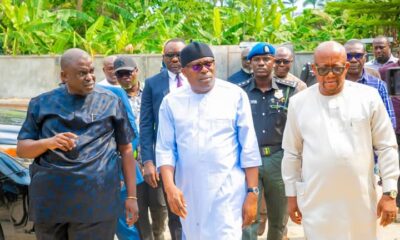News
Stop Insulting Our Govs, PDP Cautions APC Interim Chairman

The Peoples Democratic Party (PDP), yesterday, cautioned the national caretaker chairman of the All Progressives Congress (APC) and Yobe State Governor, Mai Mala Buni, to stop “sending impostors and charlatans” in his party to insult governors elected on its platform and other patriotic leaders just to divert attention from the failures and problems of his party.
The PDP counselled Buni to design a more constructive way of containing the manifest failures of APC government at the federal and state levels “instead of this jealous act of seeking to use nonentities to attempt to drag down PDP performing governors and other well-meaning Nigerians.”
In a statement signed by its spokesman, Kola Ologbindiyan, yesterday, the PDP said it was “indisputable that governors elected on the platform of the PDP have performed and are performing better, by all standards, than their counterparts in the APC.”
The statement read: “Nigerians across the country already know that the standard of living, infrastructural development, wealth creation, employment opportunities as well as growth in critical sectors including aviation, education, health, transportation power, energy, manufacturing, commerce, are better in PDP states.
“Of course, no APC governor can point to any development project that can compete with the achievements of any of our governors in any sector of life.
“Such feat is not by accident but by sheer ingenuity, hard work and accountability being exhibited by our governors in line with the manifesto of the PDP.
“Furthermore, it is ludicrous that rather than advising President Muhammadu Buhari and his government to rescind the unjustified increase in fuel price and withdraw the morbid declaration that fuel price ought not to be cheaper in Nigeria than Saudi Arabia, the APC is further insulting Nigerians by bandying unsubstantiated oil subsidy figures, to defend their atrocious policy.
“In case the APC is not aware, it is instructive to remind them that their party and government have fallen too low in the esteem of Nigerians for it to seek a rebranding through impostors as spokespersons, to funnel lies, deception and distortions of facts in a fresh attempt to beguile Nigerians.
“It is incontrovertible that contrary to the lies of APC impostors, between 2006 and 2013, successive PDP administrations, effectively managed the resources of our nation and grew our economy to become one of the fastest-growing in the world as recorded by Fitch and the International Monetary Fund, IMF.
“Perhaps, the APC should be reminded that within this period, the PDP achieved the historical debt relief (of about $18billion), which freed Nigeria from the suffocating shackles of huge external borrowings of the past.
“It is a fact that during this period, the PDP administrations reduced our nation’s budget deficits by 72 per cent stabilized our currency and overall economy to achieve the doubling of our GDP within four years from $55.65billion in 2003 to $114.36billion in 2006, as acknowledged by IMF database.
“This is in addition to improving our FDI from less than $700million per annum in 1999 to $4.3billion by 2007, which earned Nigeria a BB credit rating by Fitch.”
The party also made a comparison of life under a PDP-led government, saying “it is incontrovertible that life was better in our country under the PDP and that the purchasing power of Nigerians, in general, experienced its highest in our contemporary history under the PDP.
“Our party, therefore, counsels the APC to rather advise President Buhari to wake up to the demands of governance by ending the corruption in his oil revenue management, reduce the costs of fuel price and rejig his security and economic teams, instead of this resort to diversionary tactics.”
News
We’ll Make Fire Service Functional After 12 Yrs, Fubara Assures …Inspects Rehabilitation Works On Three Stations

Rivers State Governor, Sir Siminalayi Fubara, has expressed regrets that, for over 12 years, the State-owned Fire Service Stations were left in limbo but assured that the ongoing rehabilitation will be concluded and the stations ready for public use in the first week of March, 2025.
Fubara gave the assurance when he embarked on an inspection tour of the three Fire Service Stations to access the extent of work done with the ongoing remodelling, expansion and reconstruction activities on the sites, yesterday.
The governor visited the fire service stations located beside the Isaac Boro Park/Mile One flyover, Borokiri in the old Port Harcourt Township and Rumuodomaya Community, all in Port Harcourt and Obio/Akpor Local Government Areas.
He explained that with the ongoing work, the three major Fire Service Stations would be put into effective state to provide rapid and quick response to fire incidents in the State.
Fubara said, “For a very long time, we have had this situation that we have to depend on the multi-nationals; Shell, Agip and Chevron and even (Elf) TotalEnergies at that time, including to respond to fire incidents in the State.
“From what we have seen today, we can confirm that the contractor is working very hard to meet the deadline. We must, I repeat, we must commission this project first week in March.”
The governor said it is the responsibility of the government to have such facilities that provide vital social services available to the people to address fire incidence when they occur.
He assured that his administration would reverse the utter neglect such social services had suffered, and ensure that Rivers people, in no distant future, begin to benefit from the stations.
“As a matter of fact, I can boldly say that Rivers State has not had a functional Fire Service for the past 12 years. We are a government, and amongst our responsibilities, is to protect lives and property. Issues of fire incidents could be as a result of some mistakes in our homes.
“So, it is our duty to make sure that we are prepared to combat it whenever it occurs. We are trying to make sure that we do not depend again on the multi-nationals, but be ready and prepared to save lives and property of Rivers people,” he said.
Governor Fubara was accompanied by the former Commissioner for Water Resources, Dr Tamunosisi Gogo-Jaja, and was conducted round the facilities by the Commissioner for Special Duties, Dr Samuel Anya.
News
FG Shops For New Accountant General, Plans Exams, Interviews

The Federal Government has initiated the process of appointing a new Accountant General of the Federation and filling vacancies for permanent secretaries in the Federal Civil Service.
A memo from the Office of the Head of Civil Service of the Federation, dated January 24, 2025, and signed by the Permanent Secretary of the Career Management Office, Fatima Mahmoud, outlined the timeline for the process.
The memo was addressed to the Offices of the Secretary to the Government of the Federation, Chief of Staff to the President, ministers, and heads of ministries, departments, and agencies.
President Bola Tinubu had earlier, in December 2024, appointed Babatunde Ogunjimi as the acting Accountant General of the Federation.
The appointment, announced in a statement by the Special Adviser to the President on Information and Strategy, Bayo Onanuga, followed the commencement of pre-retirement leave by the then-incumbent AGF, Dr. Oluwatoyin Madein.
However, Madein returned to her duties after receiving a directive extending her tenure until March 7, 2025.
This development led to the reassignment of the acting AGF, Ogunjimi, who was redeployed to the Public Service Institute of Nigeria as Director of Accounts.
The directive authorising Madein’s continuation was reportedly issued by the Head of Service of the Federation.
According to the spokesperson for the Office of the Accountant General of the Federation, Bawa Mokwa, the directive reinstated Madein to her role as AGF, enabling her to oversee treasury operations until her retirement.
Mokwa clarified that under civil service regulations, embarking on terminal leave is optional, raising questions among staff about the implications of Madein’s reinstatement on Ogunjimi’s prior appointment as acting AGF.
The new memo by the Head of Service noted that accreditation of eligible candidates for the position of OAGF will commence on January 28 and end on February 1, 2025.
“Stage 1: Written Examination for eligible Candidates from North-West Zone and Oyo State on Monday, February 10, 2025.
“Stage 2: Written Examination for eligible Candidates/Directors (Accounts) in the Pool of the Office of the Accountant-General of the Federation on February 11, 2025.”
The memo further noted that further stages will hold on February 12 and 13, respectively and will be in the form of computer-based tests, while the final lap, which is the oral interview, will hold on February 14, 2025.
News
FRSC Records 9,570 Road Crashes, Arrests 21,580 Offenders In 2024

The Federal Road Safety Corps (FRSC) says it arrested no fewer than 21,580 traffic offenders between January and December 2024 across the 36 states and Federal Capital Territory (FCT).
The FRSC Corps Marshal, Malam Shehu Mohammed, disclosed this while addressing the reporters on the 2024 special patrol operations in Abuja, yesterday.
Mohammed said that the Corps recorded a reduction in the number of offenders recorded in 2024 as against 29,220 within the same period in 2023.
“This signifies a 26 per cent increase in compliance to traffic rules and regulations.
“The total number of offences committed stood at 25,942 representing 23.5 per cent reduction in traffic law violation compared to the data of the same period in 2023,” he said.
Mohammed said that the analysis of the Corps’ annual performance indicated a drastic reduction in Road Traffic Crashes (RTCs).
This, he said, was as well as in the number of people injured compared to the annual record of 2023.
“From Jan. 1 to Dec. 31, 2024, a total of 9,570 RTCs were recorded nationwide. This figure is against 10,617 RTCs recorded in 2023 which signify a tremendous reduction of 10 per cent.
“Furthermore, 31,154 people were injured in 2024 while 31,874 were injured in 2023 representing a two per cent decrease.
“However, the Corps recorded a seven per cent increase in fatalities as 5,421 people were killed in 2024 while 5,081 people were killed in 2023.
“Meanwhile, a total of 70,530 people got involved in RTCs in 2024 compared to 70,092 of 2023 signifying an increase of one per cent, ” he said.
The FRSC boss emphasised that out of the total fatalities that occurred in 2024, 411 deaths, representing 7.6 per cent of the total deaths, were not primarily caused by the crashes.
Mohammed said that the crashes were caused by a secondary factor which he described as the very monster the Corps was fighting; scooping of fuel from fallen tankers.
“This, therefore implies that without the casualties recorded from scooping fuel from crashed tankers, the Corps would have recorded 5,010 deaths in 2024.
“This will be as against 5,081 in 2023 signifying a 1.4 per cent reduction in the total number of people killed,” he said.
The FRSC Corps Marshal reiterated that the alarming rate of crashes and fatalities occurred as a result of loading of trailers with goods and persons.
This, he said, was in addition to fatigue, speed violations, overloading, dangerous driving as well as poor vehicle maintenance within the period under review.
-
Business2 days ago
Nigeria Wants Higher Quota From OPEC
-
Business2 days ago
WEF: We Have Over a Billion Barrels of Oil Reserves … Tinubu
-
Nation2 days ago
Soldiers Destroy 13 Illegal Refineries, Arrest 15 Oil Thieves
-
Rivers2 days ago
RSG Partners Coy To Train 10,000 Rivers Youths In Skill
-

 Editorial2 days ago
Editorial2 days agoHurray, Siminalayi Fubara Is 50!
-
Column2 days ago
Nuclear Stocks Soar on Stargate AI Infrastructure Announcement
-
Rivers2 days ago
Group Decries Claim Over Bukuma Royal Stool
-

 News2 days ago
News2 days agoWe’ll Make Fire Service Functional After 12 Yrs, Fubara Assures …Inspects Rehabilitation Works On Three Stations

